When Netflix launches in Africa, it’ll already have stiff competition
When it eventually launches in South Africa, the popular video-on-demand service, Netflix, will find a competitor waiting for it. TechCentral reports that Naspers, South Africa’s largest media company, is set to announce its new streaming video service on Aug. 19.


When it eventually launches in South Africa, the popular video-on-demand service, Netflix, will find a competitor waiting for it. TechCentral reports that Naspers, South Africa’s largest media company, is set to announce its new streaming video service on Aug. 19.
Last January Netflix announced its intention to launch in the South African market within two years, as part of its global expansion strategy. In South Africa, as in many other countries where the service is not available, people have been using Netflix via virtual private network (VPN) providers which make them appear as if they’re logging on from within the United States.
While at least three streaming video providers—Vidi, Altech Node and MTN’s FrontRow—have already launched in South Africa, they have failed to attract the hoped-for volume of subscribers. Traditional pay-TV is still popular, and it’s dominated by Naspers subsidiary Multichoice, which says its DsTV service has 5.4 million subscribers in the country.
To get its streaming service off the ground quickly, Naspers (through Multichoice) acquired a stake in Icflix, a service based in the UAE that currently offers Indian, Arabic, and Hollywood content. Like Netflix, Iclix is also investing in studios to produce original content. Its offering is likely to be pretty different from Netflix’s US-heavy selection, therefore, and it will be interesting to see how (or indeed whether) South Africans choose between the two services. Access to this content, as well as Icflix’s existing user base in Middle Eastern countries could give Naspers’ a competitive edge, as it launches before Netflix in these markets.
Another issue for Netflix in South Africa—and in other emerging markets—will be licensing. This, as Jan Vermulen, a South African technology journalist, points out, is a tricky business. The rights to offer video-on-demand are generally sold by region, so Netflix may not be able to offer South Africans a lot of the content its US subscribers can watch.
Naspers has also set up an interesting competitive market within itself. Vermulen reports that although it was Multichoice that acquired the stake in Icflix, Naspers then split the streaming service off from it. So these two entities within Naspers will battle each other head-on for subscribers in countries where they both operate—an unnerving contest for them, perhaps, but a shrewd bet by Naspers to make sure it stays relevant, however people watch TV.